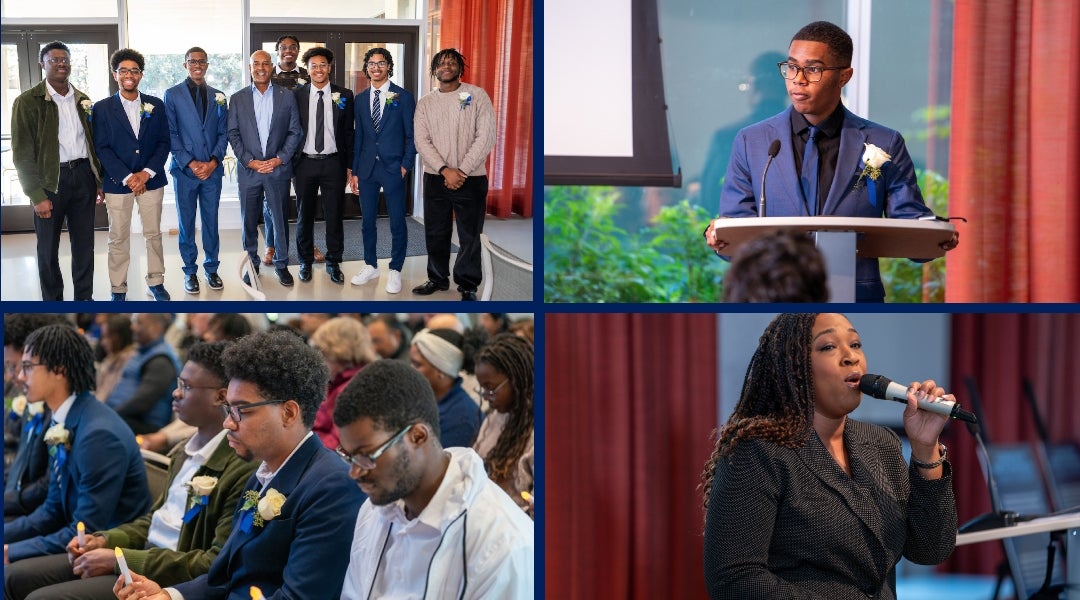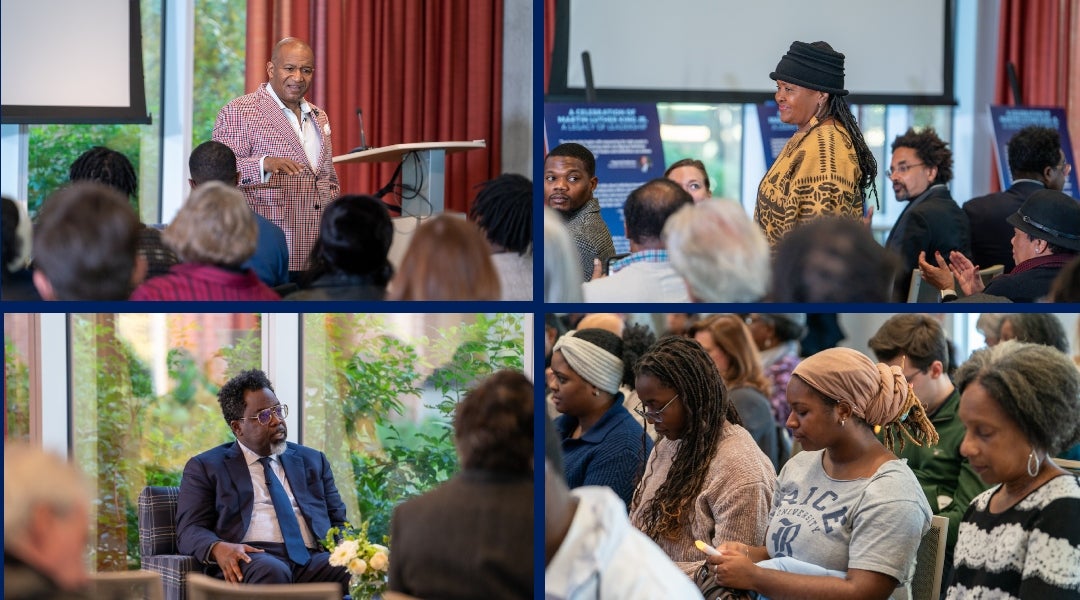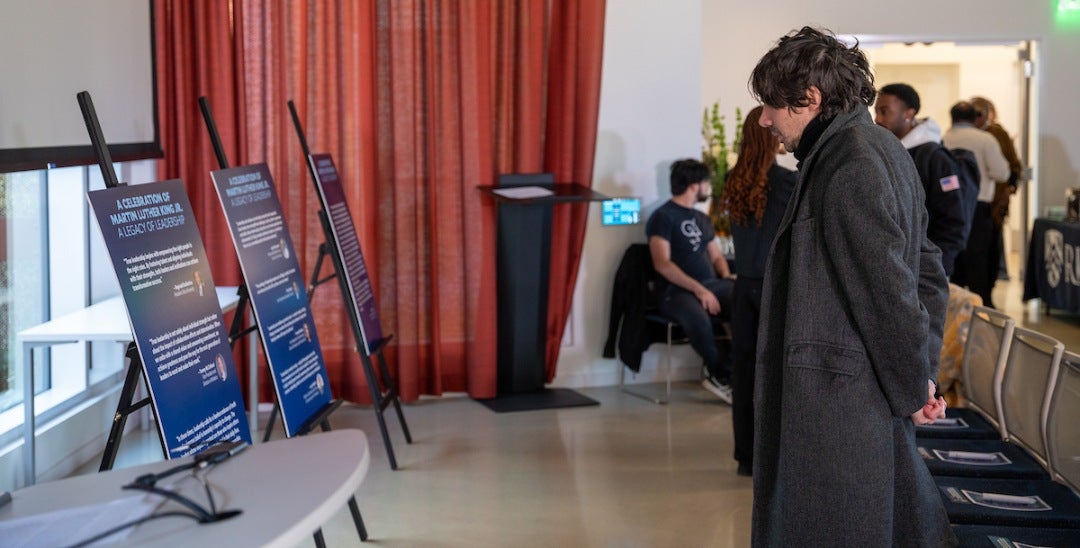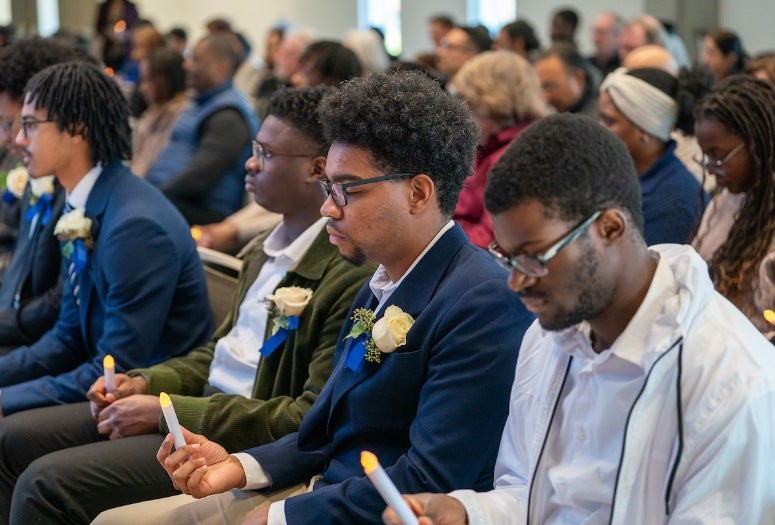
Rice University’s Black Men’s Association (RBMA), in partnership with Multicultural Community Relations in the Office of Public Affairs, hosted more than 100 people for a vigil to commemorate the life and lessons of Martin Luther King Jr. Jan. 19 in Kraft Hall. The celebration included a keynote speaker and a fireside chat, along with a poetry reading, musical performance and candlelit moment of silence.
“The Civil Rights Movement would not have been possible through the actions of one man but instead through the numerous actions of millions of citizens in this country in their own way,” said senior Trey McCray, president of RBMA.
“If we truly want to honor the life and legacy of Dr. King beyond yearly events, messages and social media posts, it would be better for us to unite and also dedicate our lives to helping materially fight against any injustices that we see and know about. In the words of Dr. King himself, ‘Injustice anywhere is a threat to justice everywhere.’ Whether it be the injustice we may see in America or anywhere else in the world, we must take it upon ourselves as current and future leaders to remove such issues. Even though we all know it will be a long road filled with numerous ever-changing obstacles, we cannot afford to lose focus. We must continue to be persistent just as Dr. King did to create and materialize the better world that he fought hard for.”
That same message was also evident in welcome remarks by President Reginald DesRoches.
“This afternoon, we gather not only to remember Dr. King’s courage in the face of great adversity but also to renew our own commitment to resilience, leadership and excellence,” DesRoches said. “Dr. King was a visionary leader. He knew that real change required more than speeches or marches; it demanded action rooted in faith, hope and an unyielding belief in the possibility of progress. As members of the Rice community and residents of Houston, we are heirs to this legacy. It is our responsibility to lead with the same courage, conviction and resilience that Dr. King embodied.”

That messaging set the stage for a program that traced King’s legacy and message of equality and purpose, which came in the form of a lesson in the ABCs from Bernie Banks, director of Rice’s Doerr Institute for New Leaders. He spoke about the importance of awakening, belief and commitment.
“[Awaken means] to stay awake and to hold vigil … in order to progress, we must experience discomfort that comes from forcing people out of their comfort zone,” Banks said. “We must awaken their understanding of the inequity faced by so many people. Basic evolutionary biology tells us that we must have what is called ‘punctuated equilibrium,’ periodic shocks that allow us to advance and to evolve. Society and human beings have never been strengthened through doggedly resisting the adaptation of things over a protracted period of time.”
Banks continued with thoughts about the power of beliefs.
“We need to believe that everyone’s life opportunities can be advanced without demonstratively lowering the standard of life experienced by those seeking to maintain their societal advantages, and that requires leadership,” he said. “It requires people who are willing to step into the uncomfortable place and say, ‘Here's an opportunity here to be better through treating others better,’ and that’s most certainly what Dr. King and his followers did. They elected to step into the uncomfortable place. [They did] so through a movement characterized not only by nonviolence but also through erudition, highlighting the power of beliefs and seeking to live those beliefs every single day.”
Banks ended by speaking about commitment.
“We must make a commitment to ensuring that we’re honoring the promise reflected in [the U.S. Constitution]. Commitment matters because commitment fosters motivation, and motivation generates energy.”
Sherwin Bryant, associate professor of history and director of the Center for African and African American Studies, joined a fireside chat moderated by junior Thomas Witherspoon that covered the current direction of leadership in the U.S. as it enters a new administration; the concerns of marginalized communities; what it means to lead a community unbiasedly while also prioritizing Black solidarity; challenges for youth enacting social change; and what resilience in leadership means.
Poignant moments dotted the afternoon, including a performance of “Lift Every Voice and Sing” by Kiana Day Williams, founder of KeyNoteED Education Consulting, and a 30-second, candlelit moment of silence when the audience was asked to envision ways their lives can embody the vision and leadership skills of King.
To enhance the hourlong event, organizers presented a video to showcase Rice students’ thoughts about what King’s dream meant to them.
As a final touch, posters surrounded the room to punctuate the program’s theme of leadership and to highlight King’s legacy, including quotes from many of Rice’s own leaders.

The vigil served as a reminder of not only King’s life and impact but also as a warmup to February’s Black History Month and the series of events hosted at Rice throughout the year that celebrate the many cultures, ethnicities and backgrounds that comprise the Owl family.
For more information about the RBMA, visit instagram.com/rice.bma. To find out more about Multicultural Community Relations in the Office of Public Affairs, visit publicaffairs.rice.edu/multicultural-community-relations.

